Natural preservatives and fixatives like frankincense, benzoin, and labdanum work with your skin's chemistry to keep perfumes fresh and vibrant. These organic compounds form strong molecular bonds that trap delicate scent molecules, preventing them from evaporating too quickly. You'll get better longevity when you combine multiple plant-based fixatives, such as sandalwood and patchouli. Understanding the science behind these powerful botanical ingredients will help you make smarter choices for your fragrance collection.
The Science Behind Natural Fixatives in Perfumes
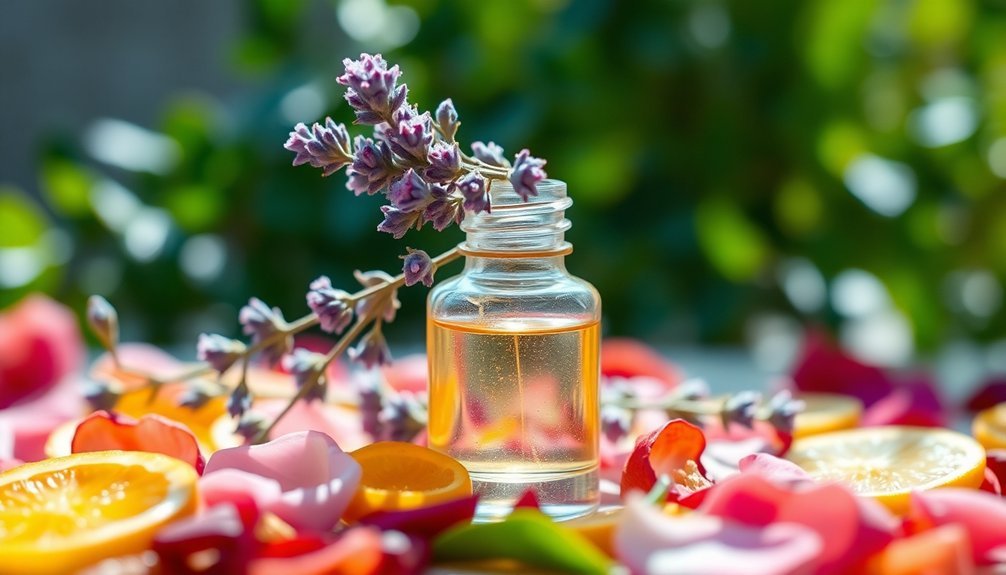
While many people focus on the aromatic components of perfumes, natural fixatives play an essential role in stabilizing and enhancing fragrances. You'll find these fixatives in resinous or woody substances like ambergris, benzoin, and labdanum, which work by binding to volatile fragrance molecules.
When you apply a perfume containing natural fixatives, they slow down the evaporation of more delicate scent components. Think of them as anchors that keep your fragrance's intended composition intact. They equalize vapor pressures and maintain the perfume's structure, ensuring you get consistent scent delivery throughout the day. These ingredients provide extended wear time on the skin, maximizing the fragrance's longevity.
Additionally, these organic compounds contribute to the perfume's sillage, helping it disperse evenly in the air while preventing the fragrance from breaking down too quickly.
Essential Plant-Based Stabilizers for Lasting Scents
As perfume makers shift toward sustainable practices, plant-based stabilizers have emerged as powerful alternatives to synthetic preservatives. You'll find these natural fixatives in labdanum from rockrose plants, musk flowers, and the distinctive muskwood tree.
They're not only gentle on your skin but also create more complex, lasting fragrances. While synthetic versions last longer, natural stabilizers provide a more authentic and nuanced scent experience.
When you choose perfumes with botanical stabilizers, you're getting more than just a pleasant scent. These natural ingredients interact with your body's chemistry to create unique aromas while offering therapeutic benefits.
Essential oils like lavender and chamomile don't just stabilize the fragrance – they help you relax and reduce stress. Plus, you're making an environmentally conscious choice, as these plant-based ingredients are biodegradable and sustainably sourced, ensuring your perfume doesn't harm the planet.
Understanding Fixative Molecules and Their Properties
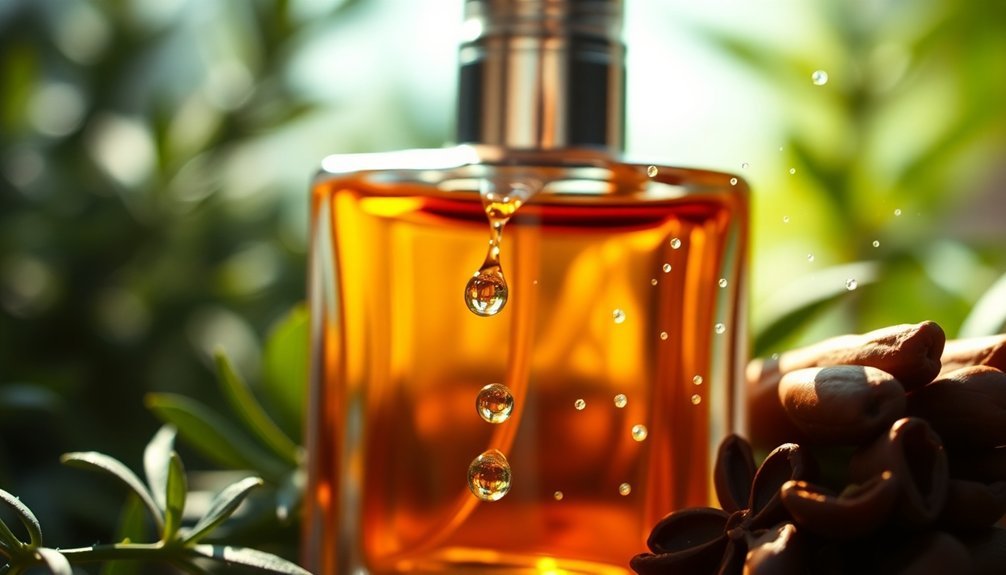
Fixative molecules work by forming strong bonds with volatile fragrance compounds, allowing you to experience longer-lasting scents on your skin.
You'll find that natural fixatives, such as benzoin and musk, create these bonds through their large, complex molecular structures that effectively trap and slow down the evaporation of lighter fragrance notes. These compounds are highly effective even when used in minute quantities.
When you're selecting organic perfumes, look for those containing plant-based fixatives like patchouli and oakmoss, which provide excellent scent retention through their natural molecular binding properties.
Molecular Binding Mechanisms
The molecular dance between fixatives and fragrance compounds forms the foundation of long-lasting perfumes. When you apply your favorite scent, fixatives bind to volatile fragrance molecules, creating a stabilizing effect that prevents them from evaporating too quickly.
These high-molecular structures anchor the aroma to your skin, ensuring the fragrance develops gradually over time. Your skin's natural chemistry plays an essential role in this process. The oils on your skin interact with the fixatives, while your body's pH level influences how the molecules bind together.
You'll notice better longevity when you apply perfume to pulse points, as your body heat enhances the diffusion process. The fixatives work through various mechanisms, including encapsulation techniques that protect sensitive ingredients until they're ready to be released.
Natural Scent Retention Properties
Natural scent retention begins with understanding molecular structures that hold fragrance compounds in place. You'll find that true fixatives like benzoin work through adsorption, using their high molecular structure to slow down the evaporation of volatile components.
These natural compounds typically make up 3-5% of a perfume's base notes.
When you're selecting fixatives, you'll need to evaluate their classification. Agreeable fixatives like frankincense add pleasant aromas while stabilizing other scents.
Essential oils such as patchouli and vetiver serve dual purposes by anchoring lighter notes while contributing their own earthy depths.
Plant resins and botanical extracts like labdanum and storax blend seamlessly with other fragrance components, creating a harmonious composition that maintains its integrity throughout the day.
Top Organic Ingredients That Extend Fragrance Life
When you're seeking natural ways to make your perfume last longer, organic fixatives like frankincense, oud, and benzoin serve as your best allies.
You'll find that woody components, particularly sandalwood and muskwood, create the most enduring base notes in natural fragrances.
These ingredients work by forming a molecular bond with your skin's natural oils, allowing the scent to linger for extended periods.
Natural Fixatives For Longevity
Selecting the right fixatives can dramatically extend your perfume's longevity while maintaining its organic integrity.
You'll find plant-derived options like labdanum and musk flowers that naturally trap fragrance molecules, preventing quick evaporation. Essential oils such as patchouli and sandalwood serve dual purposes – they're both fixatives and fragrances themselves.
When you're choosing natural fixatives, consider how they work. These organic compounds bind to volatile fragrance molecules, slowing their evaporation and ensuring your scent lasts longer on your skin.
They'll help anchor lighter top notes while allowing the fragrance to develop gradually throughout the day. While natural fixatives mightn't last as long as synthetic alternatives, they offer therapeutic benefits and are gentler on your skin.
Plus, you're making an environmentally conscious choice that supports sustainable farming practices.
Woody Notes Last Longest
Woody ingredients stand at the forefront of organic perfume longevity, offering both depth and staying power that surpasses other natural fragrance families.
When you're selecting an organic perfume, you'll find that high-quality woody notes like sandalwood, cedarwood, and patchouli provide exceptional longevity due to their concentrated essential oils.
These base notes aren't just long-lasting; they'll evolve beautifully on your skin throughout the day.
You'll notice that applying woody fragrances to pulse points enhances their natural diffusion, while layering them with matching organic body products amplifies their staying power.
What makes woody notes particularly valuable in organic perfumery is their versatility – they're equally effective in summer or winter, day or night.
For maximum longevity, look for perfumes featuring oud or vetiver, as these ingredients are renowned for their enduring presence.
Natural Vs Synthetic: a Longevity Comparison

In the ongoing debate between natural and synthetic preservatives, perfume longevity remains a critical factor for both manufacturers and consumers.
While synthetic preservatives offer superior stability and consistency, requiring lower concentrations to be effective, they don't always align with consumer preferences for clean beauty.
You'll find that natural preservatives, though less stable, can still protect your fragrance effectively when combined with natural fixatives like frankincense, oud, or vetiver.
These ingredients help delay scent loss and keep base notes noticeable longer. However, you should expect a shorter shelf life with natural perfumes – typically 3-5 years unopened and 1-2 years after opening.
Synthetic preservatives will generally keep your perfume stable longer, but if you're prioritizing organic ingredients, natural options can still provide adequate preservation when properly formulated.
Proper Storage Methods for Natural Perfumes
To keep your natural perfumes fresh and potent, you'll want to store them at a stable temperature between 60-70°F, away from heat sources like radiators and sunny windowsills.
Your best storage options include a dedicated perfume fridge or a cool bedroom drawer, which provide ideal temperature control for preserving organic ingredients.
Since UV rays can quickly degrade natural perfume compounds, make sure to keep your bottles in their original boxes or opaque containers, and avoid displaying them on open vanities or windowsills.
Temperature Control Tips
Proper temperature control serves as a crucial factor in preserving your natural perfumes' quality and longevity.
You'll want to maintain a consistent temperature between 60-70°F (15-21°C) to protect the delicate fragrance molecules from breaking down.
Keep your perfumes away from heat sources like radiators and sunny windowsills, as heat accelerates degradation and can alter the scent profile.
Don't store them in bathrooms, where humidity and temperature fluctuate frequently. Instead, choose stable environments like dedicated drawers or cabinets.
For ideal preservation, you might consider using a wine cooler or temperature-controlled storage unit.
If you're planning long-term storage, refrigeration can work, but don't let temperatures drop below 50°F (10°C).
Adding silica gel packets helps control humidity and protects your fragrances from moisture damage.
Light Protection Strategies
Light poses one of the greatest threats to your natural perfume's integrity, requiring careful attention to storage practices. You'll need to shield your fragrances from both natural and artificial light sources, as UV rays can break down their delicate chemical structure within months. Store your perfumes in their original packaging and keep them in dark, closed spaces like drawers or cupboards.
| Storage Location | Benefits | Risks to Avoid |
|---|---|---|
| Dark Cupboards | Consistent temp, UV protection | Humidity changes |
| Original Box | Extra light barrier, dust protection | Box damage |
| Guest Room Closet | Limited light exposure, stable environment | Direct sunlight |
Don't place your perfumes near windows, lamps, or electronic devices, as even dim artificial light can degrade your fragrance over time. Always seal bottles tightly after use to prevent oxidation and maintain their intended scent profile.
Maximizing Your Perfume's Shelf Life Naturally
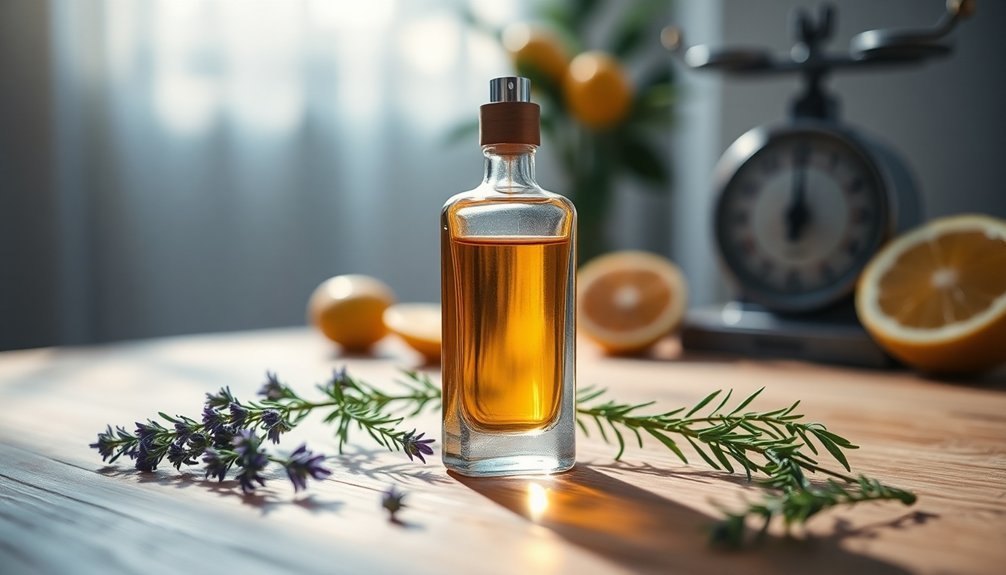
When you invest in quality perfumes, protecting their delicate compositions becomes essential for maintaining their intended fragrances. To maximize your perfume's natural shelf life, store your bottles in a cool, dark environment away from heat sources and direct sunlight.
A dry storage space will prevent unwanted chemical reactions caused by humidity.
You'll want to minimize your perfume's exposure to oxygen, which can alter its chemical composition. Keep bottles tightly sealed when not in use and avoid shaking them unnecessarily.
Consider transferring your fragrances to smaller bottles to reduce air space. For peak wear, apply your perfume to moisturized skin at pulse points, and don't rub your wrists together after application.
If you're using older perfumes, perform regular checks and patch tests to verify they haven't degraded over time.
Best Botanical Ingredients for Scent Retention
Natural preservation starts with selecting the right botanical ingredients for your perfume. You'll want to layer your scents strategically using top, middle, and base notes that work together to maintain fragrance longevity.
| Note Type | Best Botanicals | Properties | Retention |
|---|---|---|---|
| Top Notes | Bergamot, Wild Orange | Fresh, citrusy, energetic | Quick evaporation |
| Middle Notes | Rose, Lavender | Floral, soothing, complex | Medium lasting |
| Base Notes | Cedarwood, Vanilla | Woody, sweet, grounding | Long lasting |
| Complementary | Neroli, Geranium | Balancing, luxurious | Enhances blend |
When crafting your perfume, start with sturdy base notes like cedarwood or vanilla for staying power. Layer in middle notes of rose or lavender for depth, then finish with vibrant top notes of bergamot or wild orange. This strategic layering helps lock in your fragrance while maintaining its complexity throughout the day.
Environmental Impact of Natural Preservatives
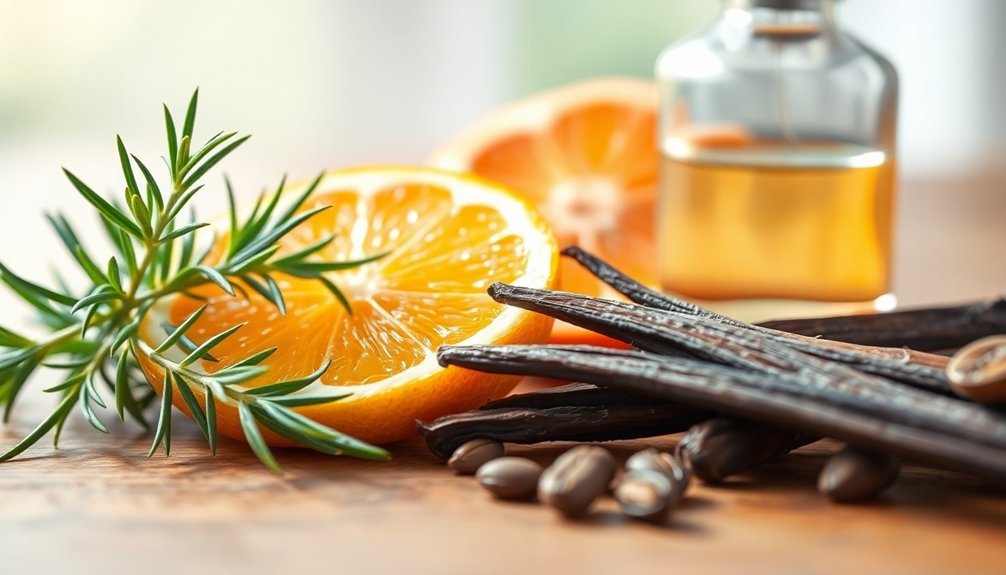
As consumers become increasingly aware of environmental issues, the shift toward natural preservatives in perfumes represents a significant step toward sustainability.
When you choose perfumes with organic preservatives, you're helping reduce the release of synthetic chemicals like benzaldehyde and camphor into the environment.
Natural preservatives, such as Grapefruit Seed Extract (GSE), don't just protect the environment – they're highly effective at extending your perfume's shelf life up to 7-9 years while preventing microbial growth and contamination.
You'll notice your fragrances maintain their quality longer when stored properly in cool, dark places.
Creating Long-Lasting Blends With Natural Fixatives
Creating long-lasting organic perfumes goes beyond selecting the right preservatives – it requires mastering the art of natural fixatives. You'll want to focus on incorporating plant-based ingredients that naturally slow down evaporation and anchor your fragrance molecules.
To create enduring blends, consider these essential elements:
- Use plant resins like benzoin and myrrh at 3-5% concentration to add warmth while stabilizing the scent.
- Blend essential oils such as patchouli and vetiver to anchor lighter notes.
- Start with base notes first, then build up your composition with middle and top notes.
- Store your creations in dark glass bottles and keep them in cool, dry places.
When you're working with natural fixatives, remember that patience is key – allow your blend to mature for 30 days to achieve ideal results and evaluate its effectiveness.
Safe Handling of Organic Perfume Ingredients
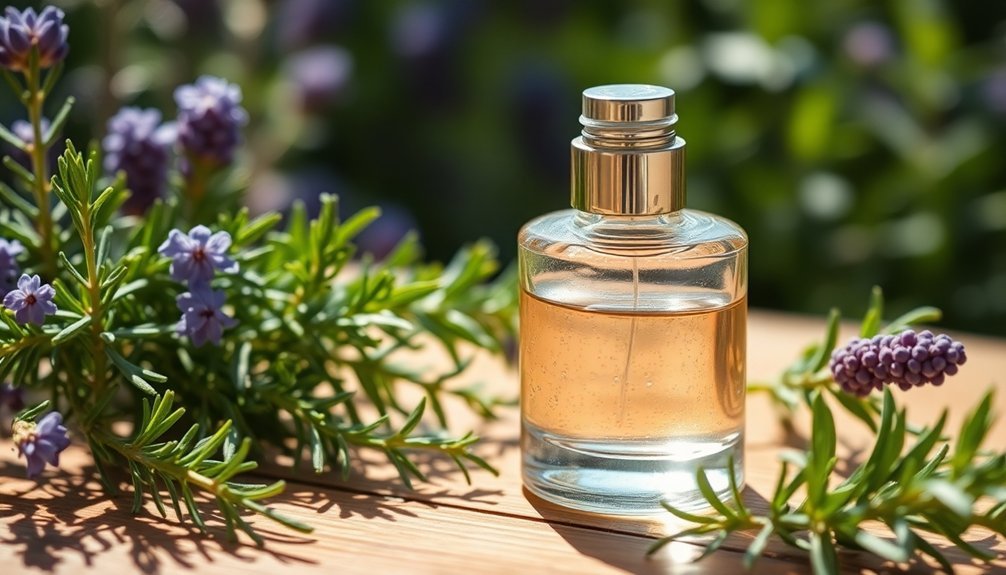
When working with organic perfume ingredients, safety protocols and proper handling techniques become essential for both your well-being and product integrity.
You'll want to avoid synthetic ingredients like diethyl phthalate and benzophenone, which can cause allergies and hormone disruption. Instead, opt for certified organic ingredients verified by COSMOS or ECOCERT standards.
To maintain your organic perfume's quality, store it in violet glass bottles away from heat and direct sunlight.
You'll need to check your perfume regularly, as natural formulations may separate after 12-24 months. While this separation doesn't mean it's spoiled, it can affect the perfume's performance.
Remember to look for full ingredient transparency from brands, as many only list "Parfum" without revealing specific components.
This guarantees you're getting genuine organic benefits.
Frequently Asked Questions
Can Pregnant Women Safely Use Natural Perfumes With Organic Preservatives?
You can safely use natural perfumes with organic preservatives during pregnancy. They're free from harmful chemicals like phthalates and parabens. Just choose products with natural alternatives like Leucidal® or phenethyl alcohol.
How Do Skin Ph Levels Affect the Longevity of Organic Perfumes?
Your skin's pH level directly impacts how long organic perfumes last. When your skin maintains its natural acidic balance (4.5-6.2), you'll get better longevity, while unbalanced pH can make fragrances fade faster.
Are Organic Perfumes Suitable for People With Specific Allergies?
You can't assume organic perfumes are safer if you have allergies. Natural ingredients like essential oils can still trigger reactions through autoxidation. It's best to patch test and consult a dermatologist first.
Do Natural Perfumes Interact Differently With Certain Medications?
Yes, your natural perfumes can interact with medications. You'll need to be cautious with blood thinners and CNS drugs, as essential oils in natural perfumes may affect drug metabolism through CYP enzymes. Consult your doctor first.
Can Organic Perfumes Be Layered With Synthetic Fragrances?
It's not recommended to layer organic and synthetic fragrances. You'll risk creating clashing scents and compromising the natural benefits of your organic perfume. The different ingredient compositions don't typically blend well together.
In Summary
You'll find that organic preservatives aren't just better for your health and the environment – they're incredibly effective at maintaining your perfume's integrity. By choosing natural fixatives like benzoin, orris root, or vanilla absolute, you're investing in both longevity and sustainability. Make the switch to organic preservatives, and you'll enjoy your favorite fragrances longer while supporting eco-friendly perfume practices.

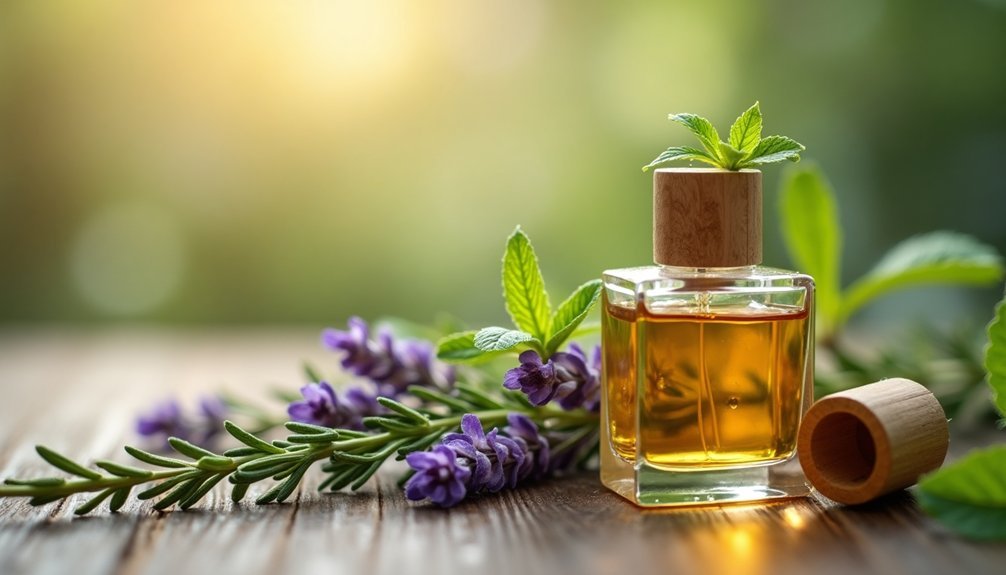



Leave a Reply